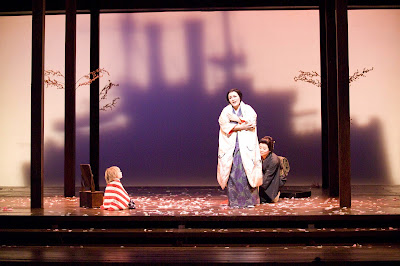As a music student in college, I was not averse to attending an opera or two. Some were more interesting than others. My mother, who always promoted my musical interests, took me to my first opera when I was a boy: Richard Wagner’s The Flying Dutchman, about a ghost ship doomed to sail the seas forever. (Why is there no movie version today? It would make a great paranormal film.) But it was Madama Butterfly that became my favorite, and the only opera I can enjoy just listening to without having to see the stage production.
In the opera, an American naval officer visits Japan and because he is staying there a while on business, he arranges to have a “temporary” wife. The inevitable happens: his business is concluded and he leaves, promising to return, and later she discovers a child will be born. He does eventually return, but with his American wife in tow. He is surprised to find his Japanese lover has a child but he is determined to bring the child home to America. The Japanese woman is so distraught over that verdict that she commits suicide in one of opera’s most tragic scenes.
While I was living in Japan in the late 1980s and early 90s, teaching English to the students of a small city, I wrote the story of an American man who meets a Japanese woman. They have a relationship then must inevitably part. A child is born. Eventually the man learns of the child’s existence and wants to do the right thing. Despite his American wife’s objection, he goes to Japan to check things out. I’m skipping over a lot of details, of course, but you see how the plot is similar to the Madama Butterfly story. That was purely unintentional.
So there you have it: Art imitating a life which imitates art.
Being a guy, of course I wanted my male protagonist to not be a jerk, to do the right thing. But he is human and thus has flaws. He also faces the clash of customs, lost among people who think differently, where the acts that make no sense to him seem perfectly logical to the local folk. Japan in the 1990s is a modern place, but in inaka (the rural, “backwoods” regions), the old, traditional ways still hold sway. So our hero, Benjamin Pinkerton (yes, I borrowed the name from the character in the opera, just to make the connection more obvious), tries to do the right thing: save a child he never knew he had while risking everything in his life back home. It is another stranger in a strange land scenario I like to write.



